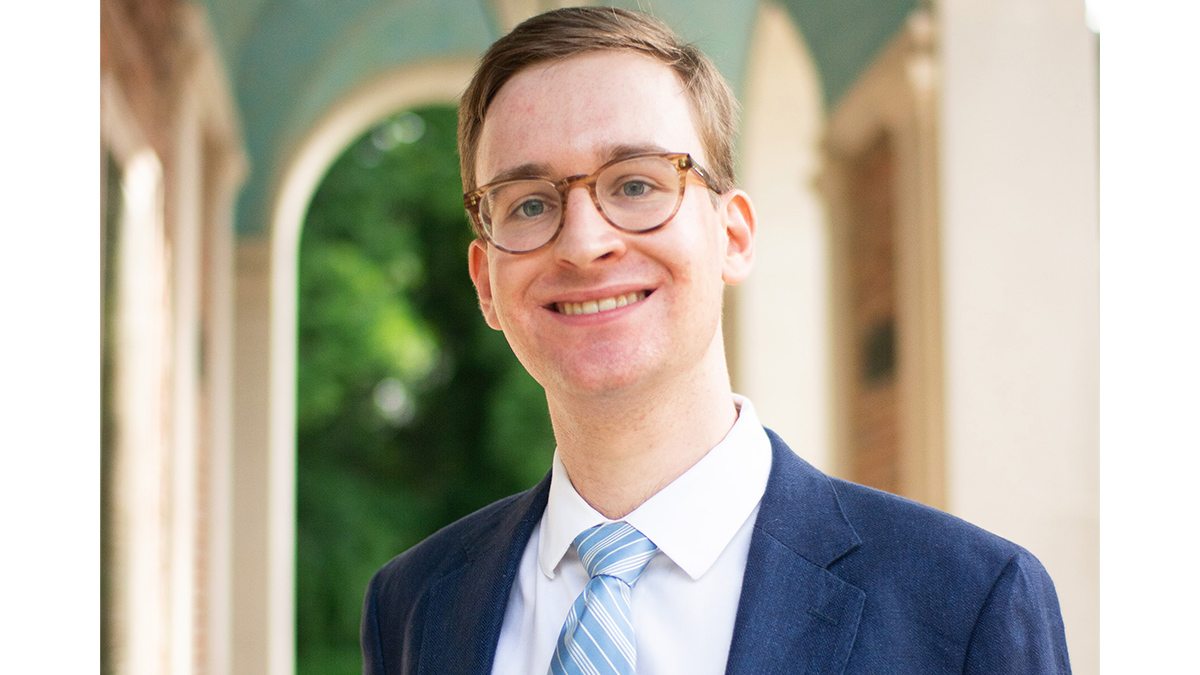Carolina graduate receives Rhodes Scholarship
Peter Andringa is UNC-Chapel Hill’s 50th Rhodes Scholar. The world’s oldest international fellowship award, the Rhodes Scholarship funds study at the University of Oxford in England.

Alumnus Peter Andringa has been selected to join the newest cohort of Rhodes Scholars. He was one of 32 Americans selected Nov. 21 for the prestigious Rhodes Scholarship, which funds study at the University of Oxford in England.
Andringa graduated in 2020 with degrees in journalism from the Hussman School of Journalism and Media and computer science from the College of Arts & Sciences. He was also a Robertson Scholar, a member of Phi Beta Kappa, a student representative on Faculty Council and a fellow at the Reese Innovation Lab.
“This incredible achievement is a testament to Peter’s hard work and dedication at Carolina,” said Chancellor Kevin M. Guskiewicz. “The Rhodes Scholarship is one of the highest honors bestowed upon our students, and I congratulate Peter on this opportunity to pursue his dreams at Oxford.”
Andringa is UNC-Chapel Hill’s 50th Rhodes Scholar since the program was established in 1902 and the 15th Carolina student selected since fall 2000.
“We are so excited to celebrate Carolina’s 50th Rhodes Scholar this year. It is a significant milestone in our great university’s 227-year history,” Guskiewicz said. “The prolonged success of our students in prestigious international programs like the Rhodes Scholarship is an example not just of all the outstanding students who attend Carolina, but also the world-class faculty and staff who mentor, support and encourage our students.”
Road to the Rhodes
As a high school student at Thomas Jefferson High School for Science and Technology in Alexandria, Virginia, Andringa aspired to have a career in big tech. But as he got older, Silicon Valley’s shine began to fade, and he became more disillusioned by the industry.
Despite the talents and capabilities of big tech companies, Andringa didn’t see them dealing with the complexities of the real world and making positive use of technology. Through his journalism courses at Hussman, he saw a new avenue to tap into his computer science skills and use emerging technologies to benefit society.
“It provided a model by which technology was being used to grapple with social problems and consider the human side of it,” he said. “It was never technology for technology’s sake. It was always, ‘How do we use technology to tell a story or make people feel something or help advocate for change?’ I really enjoyed that side of the J-School.”
Andringa combined general journalism courses with design and user experience classes and joined Hussman’s Reese Innovation Lab, where he worked with associate professor Steven King. He also conducted research to examine how social media is changing the way people interact with the news.
Additional internships with The Wall Street Journal, NBC and The Guardian helped Andringa land a position at The Washington Post, where he currently works as a data visualization engineer on elections coverage and projects that integrate technology into the Post’s reporting.
As a Rhodes Scholar, Andringa will now take a temporary step back from the industry to examine some of journalism’s most pressing challenges.
“I’m really interested in understanding the mechanics of trust online — how people trust the news, how people build relationships with news brands and journalists online, and how digital products affect how people trust it or how it’s shared,” he said.
The lack of trust in the media and its consequences, he said, have been on full display during the pandemic.
“There’s a very direct link between misinformation and harm in the pandemic,” he said. “It’s a wake-up call that we need to find ways to encourage trust in the types of media that are going to help communicate effectively with the public.”
The Rhodes Scholarship will provide Andringa with the opportunity to explore those topics deeper before returning to journalism.
“The thing that is exciting to me is the space to pursue these types of research questions that I’m interested in and that frequently connect directly back to the things I do at The Post right now,” he said. “I’m hopeful the access to experts and the access to more time to really dive into some of these topics around trust, design and digital news can transfer directly back into helping news organizations build wider audiences that trust them and ultimately disseminate more fact than disinformation online.”
Andringa will pursue a master’s in social science of the internet through Oxford’s Internet Institute, an interdisciplinary center that researches how the internet impacts society. He hopes to work across various research fields to find answers to some of the biggest questions facing journalism today.
“It draws on political science. It draws from sociology. It draws from media studies,” he said. “All of these studies need to intersect and work together to be able to grapple with these issues.”




